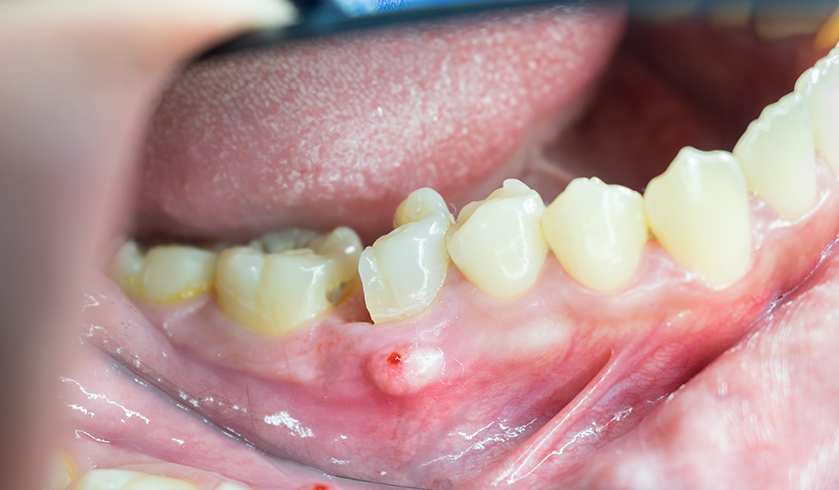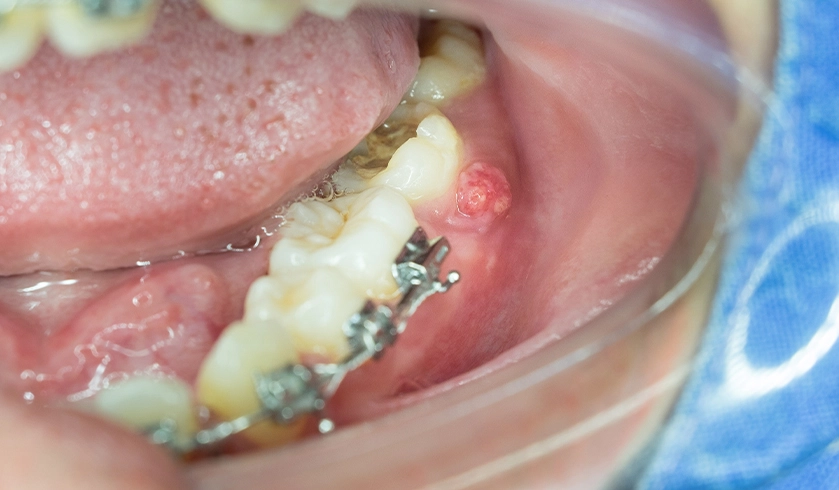A dental abscess is a collection of pus in the tissues surrounding a tooth causing inflammation, swelling and potential spread of oral infection. The sufferer experiences pain radiating through the gums and into the jaw and face. This requires the assistance of an emergency dentist for pain relief and treatment.
To save the tooth and underlying tissue immediate dental care should be sought when a dental abscess first starts. When the abscess is left untreated this may cause the infection to spread through oral cavities into the body. Sufferers may lose teeth if they leave the infection to fester without treatment.

Why Dental Abscesses Require Treatment
Although over-the-counter painkillers such as Ibuprofen may help relieve discomfort, it will not prevent or remove the infection nor treat the accumulating dental damage. Abscesses can form in any part of the body, particularly when the immune system is weak and the body’s defences to infection are low.
Dead cells attract infection agents that can trigger a build-up of pus. Abscesses may be dental or physical and are usually a sign that treatment is required.
Initially, the pus infection may start off small and without treatment develop into a bigger abscess, which may eventually burst and cause severe pain and spread of infection. Pain relief will not treat the cause of the infection nor necessarily prevent it spreading.
Professional Teeth Cleaning to Prevent Dental Abscesses
Where plaque remains after teeth and gum cleaning tartar may start to develop. The plaque and tartar can then only be removed through dentist or dental hygienist teeth cleaning and scaling with specialist dentistry instruments. It is important to have dental check-ups to assess if there are any signs of plaque and tartar which may lead to tooth decay and dental abscesses.

Dental Decay and Dental Abscess Formation
Anyone at any time may experience dental decay when plaque accumulates on and around the teeth. Although oral hygiene practice serves to clean away food debris and prevent plaque build-up, residue plaque can sometimes remain in difficult to clean areas.
Similarly, individuals wearing orthodontic braces, dentures or tooth restorations are given advice by dentists on how to properly clean their mouth and their dental appliance. This is to aid in the prevention of plaque. However, it is inevitable in some cases that not all plaque is removed.
Dental decay forms when sticky plaque build-up attracts bacteria that colonise in tooth grooves and around the tooth. The cells in tissue around the teeth may become damaged and pus can form, leading to inflammation, swelling and abscess formation.
Dietary Contributors to Dental Abscesses
Diets high in acid and sugar wear away tooth enamel and may weaken tooth structure, making the risk of dental infection and abscess development higher as the inner tooth dentin and pulp becomes exposed. Eating a healthy diet with moderate acidic and sugary food intake helps to reduce this risk and improve oral health.

Inflamed, swollen gums and tooth sensitivity may be signs that an abscess is developing. However, because other factors can cause these symptoms, such as incorrect teeth brushing technique or overuse of home teeth whitening kits, it may be hard to self-identify if an abscess is beginning to develop or present.
Attending dental check-ups is vital for diagnosis of abscess development in the early stages so that treatment may be given to prevent pain escalation and further dental damage.
Treating teeth cavities early is just as important because tooth cavities are ideal spaces for pus to collect. Painful tooth cavities with a sore jaw and face are symptoms of potential dental abscess formation. Those with an abscess may also experience fevers and excessive temperatures, especially as the abscess grows without treatment.
If a dental abscess is suspected the best action to take is to contact an emergency dentist for assessment and treatment. Doing so allows immediate care without long waits. Even if pain is intermittent treatment for an abscess should be sought, as the abscess and infection inevitably continue to develop.
Leaving the abscess untreated by not taking the step to contact an emergency dentist may lead to spread of infection, worse illness and tooth loss. It is not uncommon for people to have a tooth extracted if they avoid receiving treatment for a dental abscess.
Our clinic provides dental phobia treatments for patients who fear having treatment for dental conditions. This provides greater relaxation so patients may receive the treatment they need for better health. Patients have choices in sedation treatment and these do not have to involve needles or painful procedures. The aim is to give individuals requiring urgent dental care for issues such as abscesses the calm and comfort they need to receive treatment.
An emergency dentist or clinician will assess the person’s oral health condition, looking at the abscess type and how severe the infection is. Dental abscesses have different classifications based on the oral structure affected, such as peripheral or gingival abscesses. Dentists use diagnostic tests such as X-rays to identify the type, location and spread of the infection.
An abscess that forms on the gum surface is usually drained of pus and then compressed to relieve the pressure. To remove and prevent further infection, and for pain-relief, an antibiotic is usually prescribed.
Periodontal abscesses develop in the dental pockets and raise the risk of periodontal disease or periodontitis. These abscesses once drained leave a gap in the tooth pocket separating tooth and gum. Antibiotics do not usually reduce the likelihood of the infection returning at some point.
Periodontists or dental clinicians then clean out the dental pocket and use other dental treatments to seal the developed space between the tooth and gum. These dental treatments may involve tooth and/or gum reshaping.
In the case of periodontal or periapical abscesses, root canal treatment may be required to remove the infection from the root canals to save one or more teeth. The risk of spreading infection is high when abscesses are left untreated. Seeking early treatment is vital to prevent complex dental conditions that require extensive and costly treatment.
Where a condition called osteomyelitis develops oral surgery may be required to relieve severe pain and preserve the jaw bone. Clinicians assess the severity of an abscess and provide individuals with treatment options.
Dental abscesses may be prevented through good oral hygiene, attending regular dental check-ups and following a healthy, balanced diet and lifestyle.
Receiving early dental care for an oral infection or dental abscess means the spread of infection may be halted before other tooth structures are affected. In all cases, dentists try to preserve existing tooth structure. However, if abscesses are severe and left untreated for a long period of time, dental extraction may be necessary along with dental restoration for missing teeth.
Our clinic provides a range of treatments for missing teeth, such as crowns, bridges and dentures, which may or may not be dental implant-supported. Dental implants provide greater retention for teeth replacements.
Our service is personalised and tailored to meet the unique needs of the individual. For further information about dental hygiene practice, oral infections and dental abscesses, or to book an appointment, get in touch by phone or email and a member of our friendly team will be happy address your needs.
